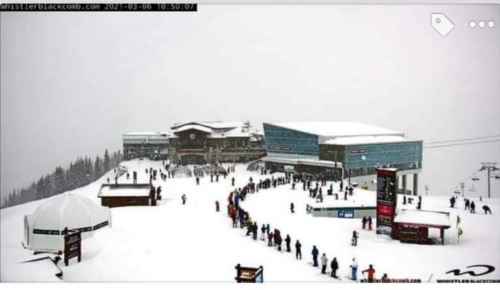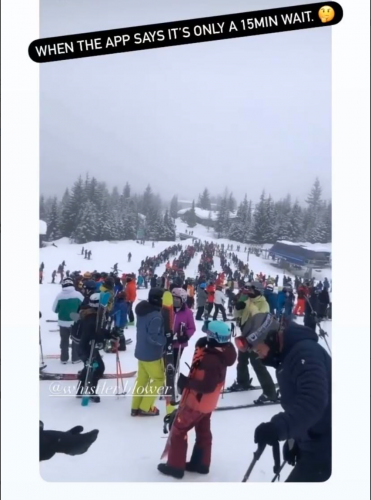Opinion: Why Quebec spring breakers hitting Whistler feels cruel to locals

Written for Daily Hive by Shannon Youngs, a newly versed writer living in the beautiful mountains of Whistler. Visit her blog slyblogwriting.wordpress.com to find more life, leisure and lgbtq+ articles
DISCLAIMER- The opinions in this post are regarding situations that occur within the duration of COVID public health orders in British Columbia.
Over the past weekend (March 5th-7th), Whistler Blackcomb not only saw over 40 cm of accumulated snow on the mountain but also witnessed some of the longest line ups of the 2020/21 season thus far, including Christmas break.
Local residents were expecting a busy weekend as Spring Breaks are on the horizon, however they were not expecting up to three-hour wait times just to get to the base of the mountain.

A webcam snapshot from Whistler Blackcomb on March 6, 2021
It was a common question from visitors this weekend, asking why the village was so busy. There were no scheduled BC or National holidays and the advisory against non-essential travel is still in place throughout many Canadian provinces. Prior to this, we have had other powder days that resulted in smaller lineups. So what brought this influx of visitors into Whistler on this particular weekend?
Local employees had noticed an increase in visitors from Quebec throughout this past week, which would coincide with Quebec’s Spring Break that fell between February 27 – March 7th.
It was also the focus of a CBC News interview with young Quebec travellers arriving at YVR airport stating: “I’m just here to go skiing and enjoy my time off” as well as “there’s nothing else to do in Quebec, so we are here to enjoy the snow.”
Please note that Quebec has 80 listed ski resorts in its province. Just a hair difference compared to BC’s 82 ski resorts, according to skiresort.info.
Many Quebec regions are still classified as orange or red zones, meaning a level 3 or level 4 alert. A level 3 -orange alert- includes curfews between 9:30pm and 5:30am where residents are not to leave their homes except in cases that justify travel (night shifts, visiting sick/injured parents, in person classes, dog-walking, hospital appointments etc).
When disobeyed this could result in fines from $1,000-$6,000. A level 4 -red alert- carries similar restrictions with an hour and a half difference in curfew, 8 pm-5:30 am.
- See also:
It has to be said that the fact that someone who leaves their house to gather in a park with their friends can be fined up to $6,000 but would not be penalized for leaving their province to gather with their friends in another community, is pretty shocking.
Travelling for non-essential reasons is not illegal but it is highly advised against at this time. Some of those choosing to travel for non-essential reasons during a global pandemic have brushed off any accountability with the argument that travelling for leisure is a human right (they are referring to Section 6. (1) of the Canadian Charter of Rights and Freedoms-“Every citizen of Canada has the right to enter, remain in and leave Canada”).
They believe that they have the right to travel anywhere they want, whenever they want, no matter the circumstances (NOTE: “travel for leisure” are the keywords there).

A snapshot of lineups on Whistler Blackcomb posted to a Whistler locals Facebook group.
Since the beginning of COVID, this has been a very touchy subject for many Canadians. Where do human rights stand when it comes to a public health and national emergency? (BC is currently in a Provincial State of Emergency)
No, travelling should not be made illegal but what if the airlines creating the space for travel could take more responsibility when it comes to its COVID procedures for domestic flights?
Requiring a negative COVID test to board a flight to another province would not be intrusive. Tests are free, accessible and if you think you’re well enough to travel, you should be well enough to pass a COVID test. This may make people put more thought into their travel plans before entering another province, meanwhile adding an extra layer of protection to other communities.
I know that if I were to visit my parents in Ontario, I would be wanting to get a test done regardless to make sure I wasn’t bringing anything into their home/small community.
Whistler has had its share of visitors coming from other provinces that have heavier restrictions in place, such as lockdowns and curfews. This is why residents still have mixed emotions when it comes to interprovincial travel.
Yes, we need business to survive. We need people to visit, play on our mountain and support our community. But many people can’t help but feel increasingly frustrated with the fact that we still cannot have a group of consenting family or friends inside of our own homes without the fear of receiving a $2,300 fine. But people are able to leave their own provinces and gather with their friends and family in our community with what seems like no repercussions.
Businesses and employees in Whistler are under heavy observation by Worksafe BC to follow the government and Public Health regulations that have been put in place; capacity, social distancing, sanitization and masks.
Day by day employees feel the heavy responsibility to ensure that they are following/enforcing the safety protocols of their employers. Employees have been spit on and verbally abused in their workplaces just for asking visitors to wear a mask. It’s Russian roulette at this point when it comes to predicting someone’s reaction when you simply ask “could you please pull up your mask?” Yes, it’s annoying to be told, but you’re probably the 11th time they’ve had to remind that day.
Whistler is filled to the brim with people who are dying to travel. Whether it be those here temporarily during their two-year working Visa or those who rely on travel for their careers (photographers, brand reps, athletes etc). We are reminded of the urge to travel every.single.day when we see travellers enjoying our community. The majority of us have stayed put and explored our own backyard. Maybe our location and our strong sense of community reminds us of the importance of staying local temporarily.
There are many people in each province who are struggling with their mental health and are not coping well with isolation, curfews and restrictions. This article is not written to urge people to stay indoors, in the dark and isolate themselves. It’s written in hopes that people will learn to stay and explore what their own provinces have to offer for the time being.
Many people have not seen their families and/or loved ones in over a year. People are missing first birthday parties, graduations and many more heart filling occasions because they are trying to see a less restricted future for all of us. Please help do your part, it’s everyone’s world and you’re a part of it.
Marc Riddell, the Director of Communications for Vail Resorts, which owns Whistler-Blackcomb, provided the following statement to Daily Hive about the safety measures in place on the mountain:
We have always encouraged guests to follow the recommendations of their provincial health authorities. To access the mountain, everyone who comes, needs to follow the safety protocols we developed in consultation with VCH. They are:
- Masks are required in all lift lines, on lifts and in all on mountain facilities
- Physical distancing is required and enforced in the lines
- Guests can only ride with their household cohorts
- To access our on mountain lodges, everyone needs to book time to go inside and have a maximum of 45 minutes to eat/warm up etc.
- A reservation is required to access the mountain (this allows us to manage capacity on hill)
You will not be allowed up the mountain if the protocols aren’t followed and we enforce all these protocols while the guest is on mountain.
For anyone who may be struggling during these challenging times and may not know where/who to turn to, please know that you can call 310-6789 (no need to dial an area code). This number provides emotional support, information and other resources specific to mental health in BC. It is toll free and available 24/7. It is provided by the Crisis Line Association of BC.

